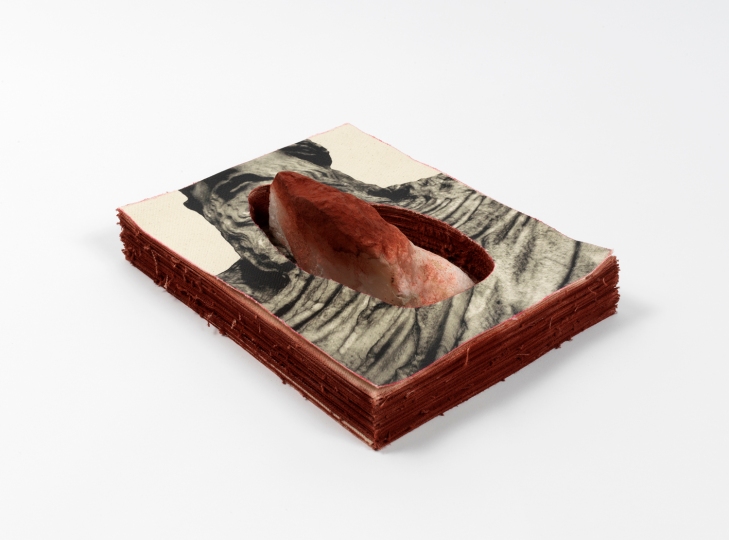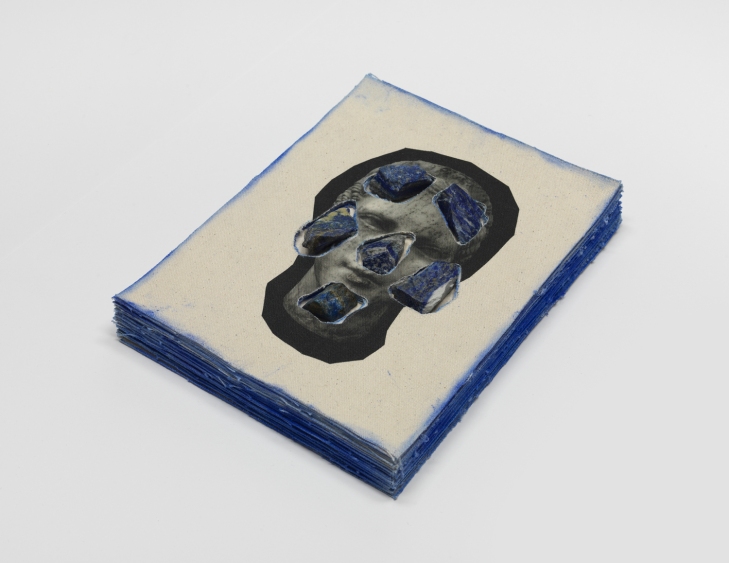During Translating Vitalities Lab 2: The Untoward, Carla Nappi and Dianna Frid worked together to begin the collaboration you find below. As part of a slowly-simmering long-term project to retell the stories of Ovid’s Metamorphoses, Carla tucked into the Deucalion and Pyrrha story. Dianna shared work in progress from her “Words from Obituaries” project, and Carla collected outtakes from them, like little stones, – in a way, to evoke the worldmaking-from-fragments that’s happening in Ovid’s text – and built them into a retelling of the Deucalion and Pyrrha story. Dianna then created the two pieces that you see below, representing each of the figures.
Here, the tale of Deucalion and Pyrrha becomes a fashioning of time with fragments of language: in the story below, the past is made from fragments of a map inscription that inspired the first story in the Metamorphoses series; the present is made from fragments of a translation of the Ovid story this piece is inspired by; and the future is made from Dianna’s obituary outtakes.
Deucalion and Pyrrha
The man and the woman found themselves in a library. And they began opening the books. They scooped out phrases like small stones and threw them out the window. As each one landed on the ground or in the water, or as it took flight, it grew into a being that could inhabit this new world and populate its then, its now, and its to-come.
First they made the past.
She gave “a round lake here” to the water, and as it dropped into the sea it spread out and gelled into an enormous jellyfish, its body full of the ghosts of crabs and squid and crayfish swimming in its flesh.
He gave “besides little” to the earth, and when it fell it bounced the memories of tiny little mosses into the soil.
She gave “a great number of men” to the air, and each of the letters grew arms that grew fingers that grew huge filmy membranes between them that buoyed each letter higher and higher and higher until it broke open into a cloud in the shape of the face of a man who had perished in the flood.
He gave “only one boy” to the sea, and as it soaked up the water it spread out in a thousand blues that together traced the map that had brought them here, and the map of blues settled into the sand, and from it grew a reef of corals that remembered the shapes of the caves and their guardians that had kept the memories of the drowned world alive even in its death.
She gave “body of a tree” to the air, and it exploded into the sensory memory of a million fallen leaves in a million reds and browns and yellows and oranges on a cool evening in a cool autumn with a fire burning nearby. And the man and the woman closed their eyes and breathed deep as their bodies cried eulogies for lost sensations.
And then they opened their eyes, and made the present.
He gave “a spreading wilderness of sudden waters” to the air. Each word grew liquid in a wet way that took on its character: sheets of moisture that bled out over the earth, and fogs of water that grew wild worlds inside them, and flashings of saturation. And in this way, he made the rain. (And it was a living, languaged thing.)
She gave “saw the deep silence” to the water. And as she thrust it from the window, the wind took on the sounds of the words and pulsed them into and out of itself. And as it dropped into the sea, the beating of the aw and the ee and the i and the en found a resonance in the depths and arced out from where they started. And in this way, she made the waves.
He gave to the earth “with timid lips both kissed the cold wet stone.” And he looked at her while he did this. And she looked back, and as the words fell to the soil the woman and the man broke from their labors – just for a long moment – and their glances made love to each other as only the looks of the last two people on earth could. And just at the moment when the words touched the ground – which was just the moment when their glances folded into one another – the letters turned to kisses and each place that a t or a p touched the ground a tree sprouted tiny from the soil. And in this way he made the forests.
She cupped “not limpid yet” between her palms and took it to the window and blew it out into the air. And each letter broke apart into an infinity of tiny dots, which instantly grew a little less tiny, and sprouted tiny transparent wings, and tiny antennae, and little bitty shiny spotted shells or short sticky bodies or starry oval eyes or pinprick heads or long jointy legs and they filled the sky with clouds of buzzing chirping life until they grew tired and slowly fell to the earth. And in this way she made the insects. And then they made the rest of the world, each time cradling a precious phrase and releasing it from the library window and watching the sea and the sky and the earth grow and change.
Finally they made the future. But they pressed their backs to the windows after giving tomorrow its language, to spare themselves from knowing what would be made from “clouds of butterflies,” from “stamp on the penthouse” and “hardly all glamour,” from “not just up and down but also sideways.” From “that bullet had something to do.” From “who he was and where,” and “made of stardust,” and “scrounge through trash for materials,” and “looking for the door.” But they could hear the gentle beating of distant wings, and quiet closings, and the pulsing of blood that was where it should not have been.
And then he turned to her and she turned to him and they tried to speak. But they had spent so much of themselves giving words away that they had none left. And so they crept through the library, and they opened the volumes one by one, and they found pages they liked and ripped them out and crumpled them up and fed them to each other, and crawled up onto the shelves together, and closed their eyes, and felt their skin hardening into leather and their spines turning to stone and silver and their insides thinning out to bony pages embroidered with threads of muscle and vein and they waited like that, until the next readers came.

2018
Canvas, photo transfer, alabaster, hematite
5 x 8.25 x 11.25 inches

2016-2017
Cloth, heat image transfer, lapis lazuli ore, cadmium blue
1.875 x 8.25 x 11.25 inches